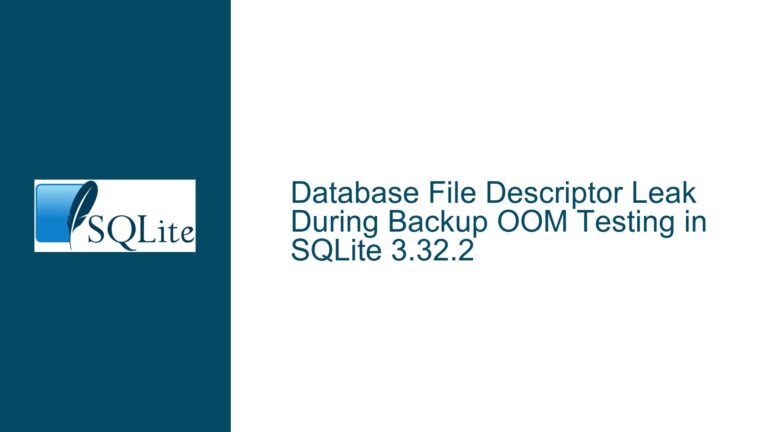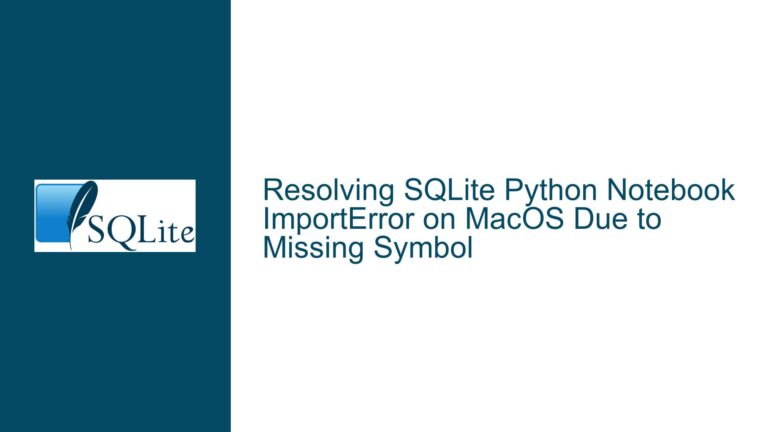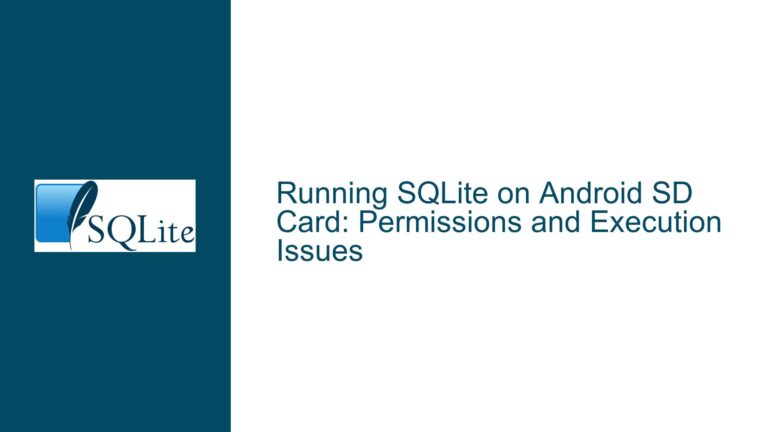SQLite 3.37.0 Thread Sanitizer (TSAN) Failure with SQLITE_OPEN_NOMUTEX and Debug Builds
Understanding the Thread Sanitizer (TSAN) Failure in SQLite 3.37.0
The core issue revolves around a Thread Sanitizer (TSAN) failure observed when upgrading from SQLite 3.36.0 to SQLite 3.37.0 on UNIX systems. The failure manifests as race conditions when multiple threads access shared data structures, despite the presence of mutex locks. The TSAN report indicates that each thread locks its own mutex when accessing common data structures, leading to potential data races. Specifically, the conflict arises between a read operation in one thread and a write operation in another thread, both accessing the same memory location. The TSAN report highlights that while mutexes are used, they are not shared between threads, which violates the expected thread-safety guarantees.
The issue is particularly pronounced when using the SQLITE_OPEN_NOMUTEX flag, which allows SQLite to operate in a multi-threaded environment without a global mutex. The failure suggests that the mutexes are not effectively protecting shared data structures, leading to concurrent access violations. This behavior is not observed in SQLite 3.36.0, indicating a regression in thread-safety mechanisms in the newer version.
Root Causes of the TSAN Failure in SQLite 3.37.0
The root cause of the TSAN failure lies in the interaction between the testcase() macro and the global variable it modifies during debug builds. The testcase() macro is used for testing purposes and is designed to prevent compiler optimizations by incrementing a global variable. However, this global variable is not protected by a mutex, leading to race conditions when multiple threads execute the testcase() macro simultaneously. This issue is exacerbated in debug builds where the testcase() macro is more frequently invoked.
In SQLite 3.37.0, the testcase() macro was expanded to be defined not only for SQLITE_COVERAGE_TEST but also for SQLITE_DEBUG. This change inadvertently introduced the race condition in debug builds, as the global variable modified by testcase() is now accessed concurrently by multiple threads without proper synchronization. The TSAN failure is a direct result of this unsynchronized access, as the sanitizer detects the concurrent read and write operations on the global variable.
Additionally, the use of SQLITE_OPEN_NOMUTEX exacerbates the issue by allowing multiple threads to operate independently without a global mutex. While this flag is intended to improve performance by reducing contention, it also increases the likelihood of race conditions when shared data structures are not adequately protected. The combination of the testcase() macro’s unsynchronized access and the lack of a global mutex in SQLITE_OPEN_NOMUTEX mode creates a perfect storm for TSAN failures.
Resolving the TSAN Failure: Steps, Solutions, and Fixes
To resolve the TSAN failure in SQLite 3.37.0, several steps can be taken, depending on the specific use case and build configuration. The most straightforward solution is to avoid using the SQLITE_DEBUG flag in builds where thread safety is critical, such as those running under TSAN or Valgrind. By excluding SQLITE_DEBUG from these builds, the testcase() macro will not be invoked, eliminating the race condition on the global variable.
For developers who require the SQLITE_DEBUG flag for debugging purposes, an alternative solution is to modify the testcase() macro to include proper synchronization. This can be achieved by wrapping the increment operation in a mutex lock, ensuring that only one thread can modify the global variable at a time. While this approach introduces additional overhead, it preserves the debugging capabilities of the testcase() macro while maintaining thread safety.
Another effective workaround is to switch from SQLITE_OPEN_NOMUTEX to SQLITE_OPEN_FULLMUTEX when opening the database connection. The SQLITE_OPEN_FULLMUTEX flag enforces the use of a global mutex, ensuring that all database operations are serialized and protected from concurrent access. This approach eliminates the race conditions observed with SQLITE_OPEN_NOMUTEX but may impact performance due to increased contention.
For those who prefer to revert to a previous version of SQLite, downgrading to SQLite 3.36.0 is a viable option. This version does not exhibit the TSAN failure, as the testcase() macro is not defined for SQLITE_DEBUG builds. However, this solution is temporary and should be accompanied by a plan to address the underlying issue in future upgrades.
In summary, the TSAN failure in SQLite 3.37.0 is a result of unsynchronized access to a global variable in the testcase() macro during debug builds. By understanding the root causes and implementing the appropriate solutions, developers can mitigate the issue and ensure thread-safe operation in multi-threaded environments. Whether through build configuration adjustments, code modifications, or version control, the key is to balance debugging needs with thread-safety requirements.






